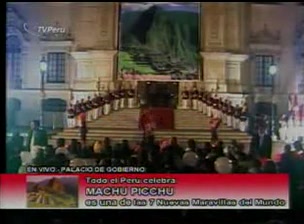Voting Analysis
Bernard Weber, Founder & President of New7Wonders, on the voting resultsAfter 7 years of campaigning and 100 million votes received, the results of the world’s first-ever global vote were announced on July 7, 2007 (07.07.07) in Lisbon, Portugal. The canon of The Official New 7 Wonders of the World was announced during a spectacular gala show in the “Estadio da Luz,” the stadium of light, in the presence of 50,000 spectators and millions of television viewers throughout the world.


After 7 years of campaigning and 100 million votes received, the results of the world’s first-ever global vote were announced on July 7, 2007 (07.07.07) in Lisbon, Portugal. The canon of The Official New 7 Wonders of the World was announced during a spectacular gala show in the “Estadio da Luz,” the stadium of light, in the presence of 50,000 spectators and millions of television viewers throughout the world.
A little more then 2,200 years after the Ancient 7 Wonders (which represented buildings built over a period of 2,000 years) were declared in 200 B.C. by a single man, Philon of Byzantium in Athens, more than 100 million votes from people from every corner and country in the world, elected The Official New 7 Wonders of the World.
This truly new set of 7 Wonders covers, once again, the time span of 2,000 years—from the Arab city of Petra and the Roman Colosseum, both of which date from the 1st Century A.D., to the wide-armed statue of Christ Redeemer on Rio de Janeiro’s Corcovado mountain, built in 1931.
Following are some of my thoughts on the results of this first global vote in humankind’s history:
Allow me to start by taking something right off the top of your mind: No, not the Chinese, nor the Indian people have played the most weighty role in choosing the New7Wonders! They did not represent the largest group of voters. The children and young people of our world did.
For the first time ever, children could participate in a global election. They were the most numerous group of voters, since the Chinese have children, the Indians do too, Americans, Eu- ropeans, Africans—all of us, we all have children. Children up to a certain age do not have a strong national sense of pride, so they were our most objective voters, they voted for what they genuinely liked best.
In addition, it was not the case—as many had feared and wrongly predicted—that only the rich Western world and developed countries would dominate the list-making. Indeed, it was the rich, saturated and (as we saw time and again) more lethargic developed world that joined the proud, much more enthusiastic developing world to choose the New 7 Wonders of the World. Inter- estingly, at the very beginning of the cam- paign, in the year 2000, so seven years ago, the first wave of votes came from Turkey.
It seemed to me that people in developing societies use the Internet differently from us in the western, northern world of plenty. For them, it is the gateway to connect with the rest of the world. In our so-called privileged, developed world, the Internet is often used to surf, chat and/or consume content.
Reflecting the diversity of our world, there are three of the New 7 Wonders in Latin America, two in Asia, one in the Middle-East and one in Europe. They represent some of the most important civilizations of the past two millennia — Arab, Chinese, Inca, Indian, Mayan and Roman.
With the 7 (no more and no fewer) votes that people had to cast via our website, plus the opportunity to cast votes via text messaging or telephone, our voting system proved to be well balanced. Internet voting was the equalizing factor, while SMS and phone votes expressed the passion and strong feelings that people had for their favorite monument. As a result, some candidates received many Internet votes from all over the world without even engaging seriously in campaigning. This was the case with the Colosseum in Rome, the only wonder standing in old Europe, representing Roman civilization. Unexpectedly, the Alhambra in Spain did not enjoy public support when it came down to voting, despite a rigorous campaign supported by the King and the Prime Minister of Spain and great local activities, such as the creation of a human chain of 3,000 people embracing the ancient fortress.
The biggest surprise, however, came from Africa in the final phase of the election—a tremendous sprint in the last weeks before voting closed. Huge number of votes poured in supporting the African candidate in Mali: Timbuktu. Mali itself sent more votes in one single week than had the entire country of Germany up to then! This propelled Timbuktu from the bottom of the list to literally scratching the top 7! Had the organizers started campaigning just a month earlier, Timbuktu would have had a serious chance to be elected as one of The Official New 7 Wonders of the World.
More people from Korea and Japan voted for the Eiffel Tower than did people from France. Many children worldwide loved Neuschwanstein Castle, but the Germans didn’t. The United States, whose inhabit- ants voted very pass- ionately and in truly huge numbers, did not vote for their Statue of Liberty. Hundreds of thousands people send us comments and words of encouragement and often thus explained their choices. Some of these moving comments are listed after this report.
On a personal note, I am especially pleased to see that the two countries, Switzerland, where I was born, and Canada, whose citizenship I adopted as my second nationality, were amongst the most active participants without having their own candidates in the running together with some exotic countries like Yemen, Albania and Afghanistan.
This new list of 7 Wonders reflects quite accurately what economists predict as the upcoming economic and industrial regions in the world in the not-too-distant future: China, India and South America. I have asked myself: Could there be a connection between, on the one hand, the motivation and the pride, enthusiasm and the compassion that people have for their culture and monuments that symbolically represent them, and, on the other, their motivation to make a brighter future for themselves?
My response is: Yes, this is definitely the case and ultimately also the reason that cultural identity is so important to every single human being and to all societies on our planet!
My personal experience traveling, spending time and sharing life in different parts of the world taught me that people who are deeply rooted in their culture are more secure and, as such, fear the stranger, the unknown much less. Their own strong identity allows them to open up and appreciate differences, valuing the enriching experience with a stranger. It is the respect and appreciation of that which is different that forges the strongest friendship.
The New7Wonders Foundation will honor the 14 New7Wonders Finalist Candidates, together with The Official New 7 Wonders of the World, forever. They all deserve the acknowledgement of being outstanding finalists, since they are all icons in their own way, representing the best that people and civilizations have left behind for future generations to respect, honor and enjoy!




No comments:
Post a Comment